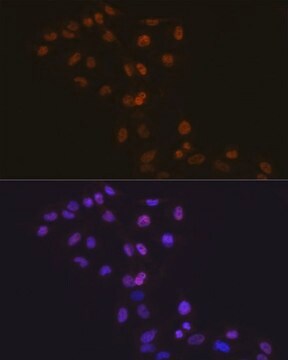MABS1917
Anti-RIP140 Antibody, clone 6D7
clone 6D7, from mouse
Synonym(s):
Nuclear receptor-interacting protein 1, Nuclear factor RIP140, Receptor-interacting protein 140
About This Item
Recommended Products
biological source
mouse
Quality Level
antibody form
purified immunoglobulin
antibody product type
primary antibodies
clone
6D7, monoclonal
species reactivity
human, mouse, rat
packaging
antibody small pack of 25 μg
technique(s)
ChIP: suitable
western blot: suitable
isotype
IgG1κ
NCBI accession no.
UniProt accession no.
shipped in
ambient
target post-translational modification
unmodified
Gene Information
human ... NRIP1(8204)
General description
Specificity
Immunogen
Application
Signaling
Chromatin Immunoprecipitation Analysis: A representative lot detected RIP140 in Chromatin Immunoprecitpiation applications (Hallberg, M., et. al. (2008). Mol Cell Biol. 28(22):6785-95).
Quality
Western Blotting Analysis: 1 µg/mL of this antibody detected RIP140 in 10 µg of MCF7 cell lysate.
Target description
Physical form
Storage and Stability
Other Notes
Disclaimer
Not finding the right product?
Try our Product Selector Tool.
Storage Class Code
12 - Non Combustible Liquids
WGK
WGK 1
Flash Point(F)
Not applicable
Flash Point(C)
Not applicable
Certificates of Analysis (COA)
Search for Certificates of Analysis (COA) by entering the products Lot/Batch Number. Lot and Batch Numbers can be found on a product’s label following the words ‘Lot’ or ‘Batch’.
Already Own This Product?
Find documentation for the products that you have recently purchased in the Document Library.
Our team of scientists has experience in all areas of research including Life Science, Material Science, Chemical Synthesis, Chromatography, Analytical and many others.
Contact Technical Service







